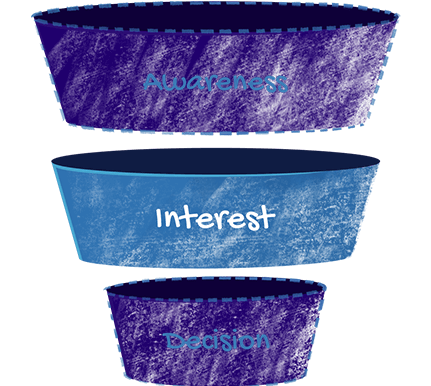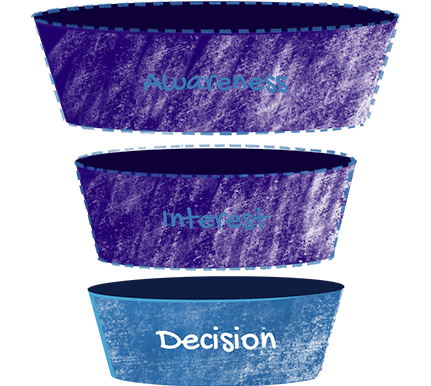What is a sales funnel?
A sales funnel is a simple linear way of breaking down a customer journey all the way from the first stage, awareness, to the final stage, point of sale.
The sales funnel is a multi-step process that converts prospective browsers into buyers. There are several steps in a sales funnel and, although every business's sales model varies, the primary stages mostly remain the same.
Ryan Deiss
Co-founder of Digital Marketer

Importance of a sales funnel
When deciding to grow a business, many people struggle with the same problem: they make sales but have no idea why their product sells. What is the length of their sales cycle? How are they nurturing leads which don't pass the initial stage? Why are their leads dropping off?
Winning companies like Starbucks, Nike, and Coca Cola are businesses who take the time to actually build a system that attracts the right leads and turns them into paying customers. They have figured out how to acquire customers and profit at scale using an effective sales funnel which is constantly updated. This helps them understand what potential customers are thinking and doing at each stage of their purchasing journey. These insights give them ammunition to follow up with the right kind of sales activities through the right channels with the most relevant message, which turns more prospects into paying customers.
Lets take a very simple example:

You spend $100 to acquire 100 leads.
At the end of the sales cycle, 5 leads make a purchase of $100 each.
Here you have a $500 return on $100 invested (500 percent).
Knowing this lets you accurately predict how much you will sell in the future. Not only does this help you with your sales plan for the next quarter, but also lets you take an informed decision on how much budget you need to allocate in order to meet your projected target for the year.
Stages of a sales funnel
Though each organization has its own unique way of generating leads and handling customer touchpoints, generally speaking, every business with a well-designed and properly executed sales funnel has three stages in common: awareness, building interest, and decision and sale.

Sales pipeline vs Sales funnel
A sales pipeline aims to consolidate the various steps involved in a sales process, from contact, qualification, meeting, and proposal to closing the deal. A sales funnel, on the other hand, captures the overall customer experience from start to end. They each have different benefits and purposes.
Sales pipeline
Shows the quantity, value, and stages of your open deals. Analyzing a sales pipeline helps you understand deal activity during the sales process and enables a sales team to make informed decisions about which factors to focus on to achieve higher conversion rates.
To know more about what is sales pipeline and how to build one.
Sales funnel
Shows conversion rates throughout the sales process. You can see which stage your leads are most likely to drop off at and assign resources to fix leaks.
Generally speaking, a sales pipeline is used to visualize the sales process from the perspective of a sales rep whereas a sales funnel is designed from the perspective of a customer. You need both working in tandem to provide a complete end-to-end customer experience.
How to build a sales funnel
We have understood why building a sales funnel is important - so that you can identify the right prospect and ensure that they have a great buying experience. Next, lets jump into an example of how we can build a perfect sales funnel for your business.
Capturing leads
Most organizations generate leads through multiple channels. For example, leads who contact you through a webform on your homepage, leads who interact with you on social media, leads who email you, and leads who you meet at a trade show. The first step is to set up your CRM to capture all these leads and tag them based on their source. Once you have tagged them, the next thing to do is to assign them to your sales reps based on parameters like geography, company size, lead score, etc. Having a CRM with automated lead assignment and territory management features is a big bonus here.

Qualify leads
Qualifying leads is probably the most important stage in the sales funnel as it directly impacts the productivity of your sales team. A sales rep's time is valuable and pursuing every lead with the same effort is like throwing darts in the dark. This is where a CRM system with lead scoring functionality can benefit your team greatly.
Assign lead scores for every positive customer attribute based on how well they match your ideal customer profile. For example, how big is the company? What industry are they in? Where are your ideal customers located? What's the ideal use case? Which tools have they used in the past? What kind of ecosystem do they have? Make sure the CRM system automatically grades leads based on these scores and assigns the leads with the highest scores to your sales teams.
Another important feature to have in a CRM is automated data enrichment. For example, Zoho CRM's intelligent assistant Zia can crawl for information based on the email, account name, or website provided, find information about the person or company, and update it automatically in your records.

Engage leads in the funnel
You have a list of leads. They are tagged, organized and scored according to how well they suit your ideal customer profile. The next task is to get in touch with them. Keeping all your leads engaged consistently can be a time-consuming chore, especially when you have hundreds of leads in your funnel all waiting to be contacted.
The simplest way to engage your leads is with an automated lead nurturing email. Most modern CRM systems can do this. For example, you could set up a lead nurturing campaign in your CRM to send a welcome email immediately when someone signs up for a trial of your products, and then, a couple of days later, an email which highlights your must try product features. Or if a potential customer has been hovering around your Pricing page for a few weeks but hasn’t yet pulled the trigger, you could send them an email with five reasons to purchase the your product.

The beauty of email nurturing campaigns is that all of the engagement happens automatically based on triggers and user segments that you define in your CRM. But what happens when a user replies to your emails? Most CRMs, including Zoho CRM, track your emails and notify your sales reps the moment a lead opens or replies to your emails.
But what if emails aren't your cup of tea? In that case, integrating your CRM with your telephony provider enables you to track whether the sales team contacted customers at predefined times and what the outcome of each call was. Your team can make and answer calls right from their CRM and measure every call's result in terms of deals. You'll also have call histories for each record, so you'll never lose track of previous conversations.
Moving leads through the funnel
Finally, there comes a time when your lead has shown an interest in making a purchase. Now is the time to convert the lead to a contact, and create corresponding deals for the business opportunity. Next, in order to close the deal and make it a sale, you need to persuade your contacts with helpful resources that can help them get off the fence. This could include a one-on-one demo of your product, an extended trial, or a one-time discount. At this stage, it's crucial to ensure that your sales team keeps the deal records updated at all times.
An easy way to automate this whole process is to ensure that your CRM is configured with the deal qualification process in your organization. Now, your sales reps can update the stages of the deal (such as prospecting, appointment scheduled, or deal qualified) and keep their managers in loop, too. Workflows come in handy at this stage. You can configure your CRM to update deal records automatically when the contacts complete certain actions such as attending webinars or receiving quotes. This allows your sales reps to concentrate more on selling and less on CRM maintenance.

Re-engage lost leads
However hard you try, attempting to convert all the leads you generate to deals is a herculean task. Push too hard for a sale and you may push your lead away. Fail to follow up, and your lead will almost certainly vanish. The good news here is that with a CRM, when a potential sale falls through, all the information about the sale is still available at your fingertips, provided you recorded all the information in the stages of your pipeline.
Now all you need to do is to take a step back and analyze the sales funnel using your CRM software. Zoho CRM, for example, lets you identify leads who have fallen through gaps in the sales funnel. The good news is you can still find new opportunities with the lost leads.
Create a re-engagement campaign in your CRM and target your lost leads by providing value in the form of industry insights, case studies, or promos. Or you could send holiday emails, which are a great way to give a personal touch to your communication with both existing and potential customers. The key is to make your leads feel that you are there not just to sell a product, but to nurture a relationship.

Zoho CRM has everything you need to build a high-performing sales funnel
Zoho CRM empowers a global network of over 250,000 businesses in 180 countries to convert more leads, engage with customers, and grow their revenue. With Zoho CRM, you can visualize your sales funnel and stay on top of all your leads and deals. With a powerful analytics engine in Zoho CRM, you can also analyze the leads which fell through the funnel, gain useful insights, and reduce the chance of losing out on valuable deals.
Generate, organize, and manage leads with ease
Don't get bogged down by the sheer number of leads in your system. Use Zoho CRM to automate lead generation from multiple sources, like websites, chats, social media, and trade shows. With automated lead assignment, distribute lead them to the right reps and ensure you don't miss out on converting quality leads.

Everything you need to convert leads to deals
Your leads are almost never ready to buy immediately—it’s up to a sales rep to build a lead’s interest so that they can make a purchase. You have to stick with your lead at every stage of their journey and provide the right information to nurture them towards making an informed decision. Zoho CRM makes sure you stay up-to-date with every lead interaction and automates your sales process so you can build lasting relationships.

Automate routine tasks and save more time
Your sales team doesn't get paid to perform menial tasks, they get paid to close more deals. With workflows, you can automate all of your operational and data entry tasks which take up a lot of your sales reps' time, like sending email notifications, creating tasks, and updating fields. From lead creation to deal closure and everything in between, Zoho CRM's Blueprint can capture your organization's sales process and make sure everyone in your team follows the right process, even when you're not looking.

In-depth CRM analytics to help you make smarter business decisions
From lead analytics to deal insights, activity stats, and email analytics, Zoho CRM's advanced analytics help you monitor every aspect of your sales funnel. Create customized dashboards with analytical widgets for sales, such as charts, target meters, KPIs, and funnels. Make data-driven decisions with customizable reports and boost your sales success with actionable data intelligence. Funnel charts can bring greater clarity to your sales data by allowing you to visualize the progressive reduction of data through your different sales stages.

Life is easier with Zia, your own AI companion
Zia is an AI companion in Zoho CRM which is here to help you manage your CRM intelligently. Zia can fetch the information you want, take notes as you dictate, detect anomalies, automate mundane tasks, and more. Zia can predict the win probability of every ongoing deal and assign a dynamic score based on how close they are to conversion. Stay focused on the right targets!
Ready to build your sales funnel with the world's favorite CRM?
Zoho CRM has been in the enterprise software industry for over 13 years, and it's grown to become the preferred choice of sales teams around the globe. Over 250,000 businesses in 180 countries trust Zoho CRM to build great sales funnels and help them close more deals in less time. Are you ready to start your CRM journey with Zoho.


